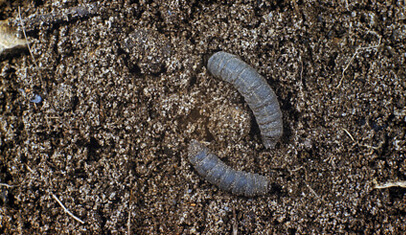
Late summer is a great time for enjoying your garden – the slightly cooler temperatures mean you can stay out for longer without overheating. But don’t neglect your lawn in your scramble to enjoy the last rays of sunshine!
Late summer is when crane flies lay their eggs, which can be a hazard to your grass. The larvae (maggots) that hatch from crane fly eggs are sometimes called leatherjackets. They eat the stem and roots of grass, making them a serious hazard for lawn owners.
We may not be able to stop a crane fly from laying its eggs, but we can ensure that your grass out-competes the leatherjackets and suffers only minimal damage – if any.
Leatherjacket control
Keeping your lawn well-maintained is one of the best ways to prevent leatherjacket damage. Here's what we recommend:
- Aeration involves spiking holes into the soil to drain the soil more thoroughly. Crane fly eggs like damp conditions, so well-drained soil will help minimise the number that survive long enough to hatch.
- Scarification – removing thatch and dead moss from the lawn surface – will also prevent any eggs being laid in that layer of thatch. The fewer eggs laid, the better!
- Fertilising your lawn will also help keep leatherjacket damage to a minimum. Stronger grass can weather the damage caused by hungry grubs much more easily than weak, undernourished grass.
If you need help looking after your lawn, drop us a line. We provide all of these services and more besides.
Our Lawn Treatments
Late summer lawn care: other things to think about
It’s not just crane fly larvae you have to be wary of in late summer. Watering your lawn is vital during the hot, dry summer months. Watering the lawn heavily 1 to 2 times per week encourages deeper root penetration, which helps grass cope with dry weather and hungry grubs.
(Don't overdo it, though. If you water the grass too much, you risk keeping the upper soil moist – and moist soil is perfect for crane flies!)
You should also mow your lawn regularly, although it is prudent to let your grass grow slightly longer during periods of very dry weather. Cutting the grass when it's dry is not good for it, and besides, grass doesn't grow as quickly when there's not much rain. However, when the weather is wet and warm, we recommend cutting your grass at least once a week.
Finally, late summer is a good time to start preparing your lawn for autumn. As the nights draw in and the weather turns colder and damper, lawns become more vulnerable to diseases like red thread. Fertilising your lawn and treating it for weeds and moss will help to keep the grass healthy as we approach the end of the year.
*
For professional lawn care at a fair price, contact Lawn & Weed Expert today. We've got 23 years of experience under our belts, and our specialist lawn treatments deliver fantastic value for money.
Unlike some other lawn care providers, Lawn & Weed Expert is not a franchise - we are based in Cardiff and all work is carried out by our own highly trained employees. If you're frustrated with your current lawn care company, get in touch and give us a try.
Contact Lawn & Weed Expert